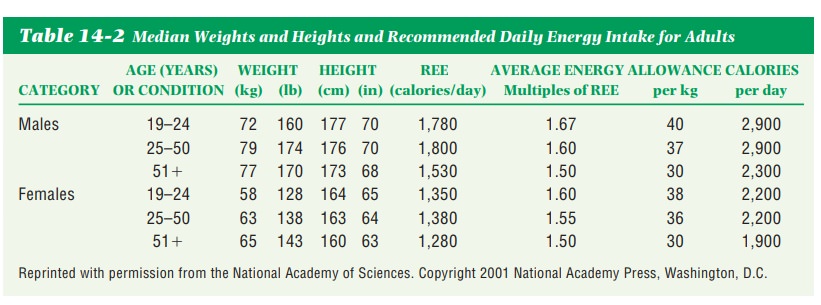Chapter: Nutrition and Diet Therapy: Diet During Young and Middle Adulthood
Nutritional and Calorie Requirements - Diet During Young and Middle Adulthood
NUTRITIONAL REQUIREMENTS
Growth is usually
complete by the age of 25. Consequently, except during pregnancy and lactation,
the essential nutrients are needed only to maintain and repair body tissue and
to produce energy. During these years, the nutrientrequirements
of healthy adults change very little.
The iron requirement
for women throughout the childbearing years remains higher than that for men.
Extra iron is needed to replace blood loss during menstruation and to help
build both the infant’s and the extra maternal blood needed during pregnancy.
After menopause, this requirement for women matches that of men.
Protein needs for
healthy adults are thought to be 0.8 gram per kilogram of body weight. To
determine the specific amount, one must divide the weight in pounds by 2.2 to
obtain the weight in kilograms and then multiply the weight in kilograms by
0.8.
The current
requirement for calcium for adults from 19 to 50 is 1,000 mg, and for vitamin
D, 5μg. Both calcium and vitamin D are essential for strong bones, and both are
found in milk. Bone loss begins slowly, at about the age of 35 to 40, and can
lead to osteoporosis later. Therefore, it is wise for young people, especially
women, who are more prone to osteoporosis than men, to consume foods that
provide more than the requirements for these two nutrients. Three glasses of
milk a day nearly fulfill the requirement for each of these nutrients.
Increasing this amount could prevent osteoporosis. Fat-free milk or foods made
from fat-free milk should be consumed to limit the amount of fat in the diet.
CALORIE REQUIREMENTS
Calorie requirements begin to diminish
after the age of 25, as basal metabo-lism rates decrease (Table 14-2). After 25
years, a person will gain weight if the total calories are not reduced
according to actual need, which will be deter-mined by activity, BMI (REE), and
amount of lean muscle mass. Those who are more
active will require more calories than those who are less active.

Related Topics